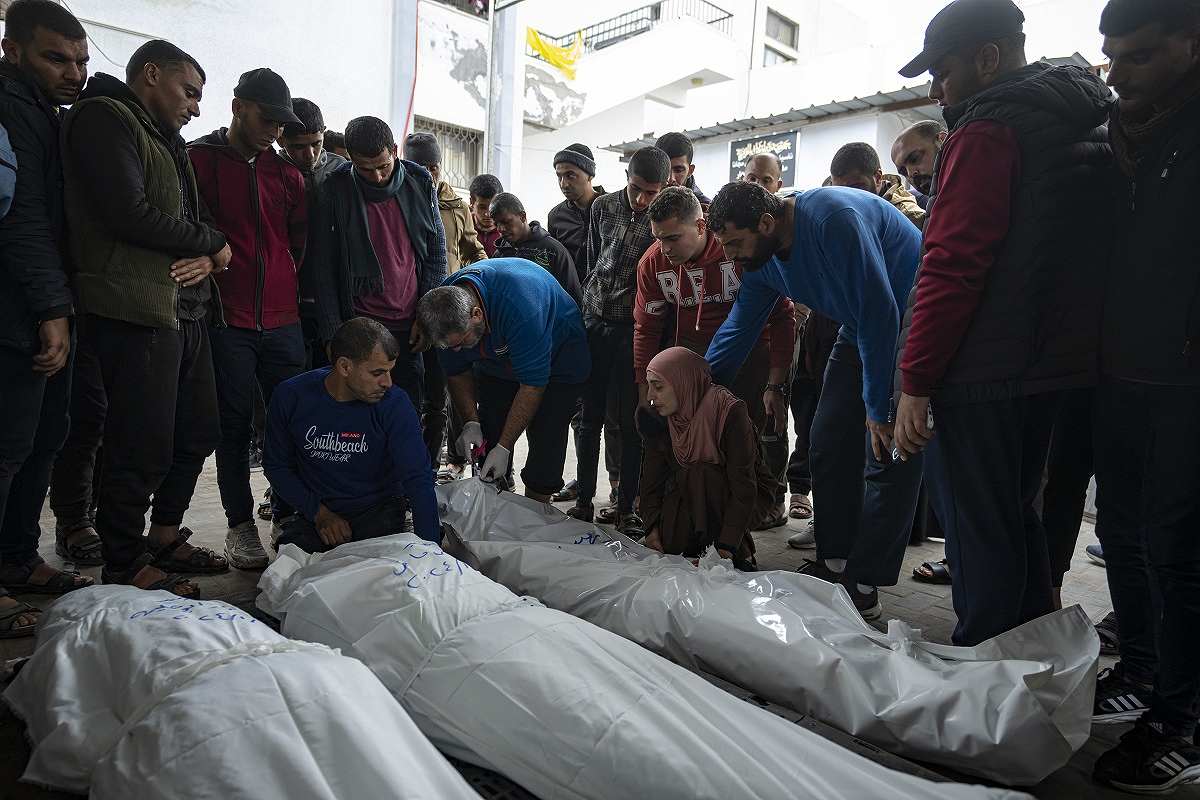
Palestinians mourn their relatives killed in the Israeli bombardment of the Gaza Strip, outside a morgue in Rafah, southern Gaza, Wednesday, Jan. 3, 2024.
14:13 JST, January 5, 2024
The simmering crisis in the Middle East, sparked by the start of the war in Gaza nearly three months ago, threatens to boil over amid strikes and violence across the region.
Notably, tensions are growing despite few indications that actors in the region are eager to fight. Most notably, Iran and its allies have largely refrained from open warfare against Israel and its allies since the Oct. 7 attack led by Hamas.
However, experts warn that given the range of actions happening across the region, and the array of actors with different motivations, a simple miscalculation could quickly spiral out of control.
“They’re playing a very dangerous game – it’s chicken, basically,” said Joost Hiltermann, a Middle East expert at the International Crisis Group, of the various actors in the Middle East. “Any miscalculation, any miscommunication, any accidental strike could trigger a major escalation.”
This week alone has seen the targeted killing of a top Hamas leader in Beirut and a leader of an Iraqi militia in Baghdad. Last week, a senior member of the Islamic Revolutionary Guard Corps was killed in Damascus. In the Red Sea, Yemen’s Houthi rebels have continued their threats to disrupt commercial shipping despite the warning of military action from the United States and its allies.
Iran, a key backer of the anti-U.S. “axis of resistance,” is also reeling from a bomb attack that killed 95 people on Wednesday, for which the Islamic State claimed responsibility. The attack took place at an event commemorating Maj. Gen. Qasem Soleimani on the fourth anniversary of his assassination in a U.S. drone strike in Iraq in 2020.
Late last month, Israeli Defense Minister Yoav Gallant told a parliamentary committee that the country was already defending itself in a “multi-arena” war that went beyond Gaza and the West Bank.
“I say here in the most explicit way: Anyone who acts against us is a potential target. There is no immunity for anyone,” Gallant said.
Here are some of the flash points across the region:
Lebanon
A senior Hamas official was killed in a strike in Beirut on Tuesday that bore all the hallmarks of a targeted killing by Israel.
Saleh Arouri is the highest-ranking Hamas official killed since Oct. 7, when the Palestinian group led a cross-border attack into Israel that killed 1,200. Israeli officials have warned that they would target Hamas officials living internationally, though they have not claimed direct responsibility for the killing of Arouri.
The assassination comes amid long-running speculation that Hezbollah may join Hamas’s war against Israel. Since Oct. 7, the militant group has engaged in cross-border attacks on Israel, though it is generally considered to have held back from full hostilities.
Arouri was killed in Dahieh, a residential neighborhood near Beirut that is considered a Hezbollah stronghold. Hasan Nasrallah, the leader of Hezbollah, said in a speech Wednesday that there would be a “response and punishment” to the assassination of Arouri.
Rym Momtaz, a fellow with the International Institute for Strategic Studies, said that Hezbollah would likely face pressure from its supporters to respond, but that it also had to factor in Lebanon’s precarious economic situation.
“A big part of the Lebanese population just cannot even fathom going through another war, given what they’re already going through right now,” Momtaz said, referring to a financial crisis in the country that has plunged 82 percent of the country into poverty.
Iraq
An Iranian-linked militia commander was killed in Baghdad on Thursday in a rare U.S. airstrike in the center of the Iraqi capital.
The target, Mushtaq Talib al-Saidi, was deputy commander of operations in the Baghdad region for the militia Harakat Hezbollah al-Nujaba, according to a statement by the group. The militia had claimed responsibility for several attacks on U.S. troops in Iraq since Oct. 7 – part of a broader spate of recent attacks that aim to force the United States to end its presence in Iraq.
Harakat Hezbollah al-Nujaba is part of a coalition of Iranian-backed groups known as the Popular Mobilization Forces (PMF) that worked with the Iraqi military to defeat the Islamic State after it took over much of the country in 2014. The militia officially falls under the command of the Iraqi army.
In a statement Thursday, Iraqi military spokesman Yahya Rasool said that the U.S.-led international coalition forces were responsible for an “unwarranted attack on an Iraqi security entity” that amounted to “blatant aggression and violation of Iraq’s sovereignty and security.”
Roughly 2,500 U.S. personnel are based in Iraq at present, with Iraqi Prime Minister Mohammed Shia al-Sudani saying that their presence is needed to help stop the Islamic State from regaining ground.
PMF militias have been behind over 100 attacks on U.S. forces in the country since Oct. 17, according to U.S. counts, marking a significant escalation and resulting in rounds of retaliation.
Syria
Israel has repeatedly hit Syria since Oct. 7, with the Israel Defense Forces on Tuesday announcing that it had hit “military infrastructure belonging to the Syrian Army” in response to missile launches toward its territory.
In late December, Iranian state media reported that Seyed Razi Mousavi, a senior official with the country’s Islamic Revolutionary Guard Corps, had been killed in a strike in the Sayeda Zeinab neighborhood of Damascus.
In accounts of his death, Mousavi was described as a former colleague of Soleimani, the Iranian military leader who has garnered a status as a martyr since his killing by the United States. Soleimani had led the Quds Force, the arm of the Revolutionary Guard that worked internationally.
Randa Slim, director of the Conflict Resolution and Track II Dialogues Program at the Middle East Institute, said the death of Mousavi was a more significant blow than Arouri for Hezbollah and Iran.
Iranian officials pledged to retaliate for Mousavi’s death, with Hossein Akbari, Iran’s ambassador to Syria, saying that Israel would get a “response to this crime at the right time and the right situation.”
Yemen and the Red Sea
Yemen’s Houthi rebels have staged numerous attacks on merchant ships passing the Red Sea. On Wednesday, they claimed an attack on a Malta-flagged ship they said was heading for Israel.
The regular attacks on the key trade route have led some major shipping companies to avoid the Bab el-Mandeb Strait, a slim waterway near the area controlled by the Iranian-backed militant group in Yemen.
In response to the economic disruption, the United States and its allies formed a multinational initiative dubbed Operation Prosperity Guardian. U.S. Navy ships have engaged with Houthi forces, sinking three boats in one exchange on Sunday, according to the Pentagon.
In a statement posted to social media Tuesday, the Houthis warned that “any American aggression will not go unanswered.”
The Houthis have also fired longer-range missiles at Israel since Oct. 7, claiming they will keep targeting Israel until “Israeli aggression stops.” Most missiles have been intercepted by Israeli air defenses.
Since seizing control of Yemen’s capital in 2014, the Houthis have become one of Iran’s most capable allies in the region and among the most independent. Analysts say that by disrupting shipping in support of Hamas, they are both appealing to their domestic supporters and establishing themselves as peers to more established groups like Hezbollah.
Iran
Iran was also touched by violence on its soil this week, as twin blasts in the central city of Kerman on Wednesday killed at least 95 people who had been visiting Soleimani’s birthplace to commemorate his death.
The attack was not linked to Israel or the United States, but another key regional foe: the Islamic State, which claimed the blasts in a message posted to social media on Thursday.
“ISIS hates Iran more than Israel hates Iran, if such a thing is possible,” said Hiltermann, using an acronym to refer to the extremist group.
So far, Israel has not struck Iran directly since Oct. 7, though Israeli officials have suggested they would do it if the conflict expands. Analysts say, however, that Iran is unlikely to back down from its support for Hamas and other regional allies.
“Any such event by itself wouldn’t lead to war. But the more these assassinations accumulate, the more they start happening one after another, the more you move toward a trigger where somebody says, to hell with it,” said Slim, of the Middle East Institute. “Then, we’ve got a large war on our hands.”
Top Articles in News Services
-

Survey Shows False Election Info Perceived as True
-

Hong Kong Ex-Publisher Jimmy Lai’s Sentence Raises International Outcry as China Defends It
-

Japan’s Nikkei Stock Average Touches 58,000 as Yen, Jgbs Rally on Election Fallout (UPDATE 1)
-

Japan’s Nikkei Stock Average Falls as US-Iran Tensions Unsettle Investors (UPDATE 1)
-

Trump Names Former Federal Reserve Governor Warsh as the Next Fed Chair, Replacing Powell
JN ACCESS RANKING
-

Producer Behind Pop Group XG Arrested for Cocaine Possession
-

Japan PM Takaichi’s Cabinet Resigns en Masse
-

Man Infected with Measles Reportedly Dined at Restaurant in Tokyo Station
-

Israeli Ambassador to Japan Speaks about Japan’s Role in the Reconstruction of Gaza
-

Videos Plagiarized, Reposted with False Subtitles Claiming ‘Ryukyu Belongs to China’; Anti-China False Information Also Posted in Japan























